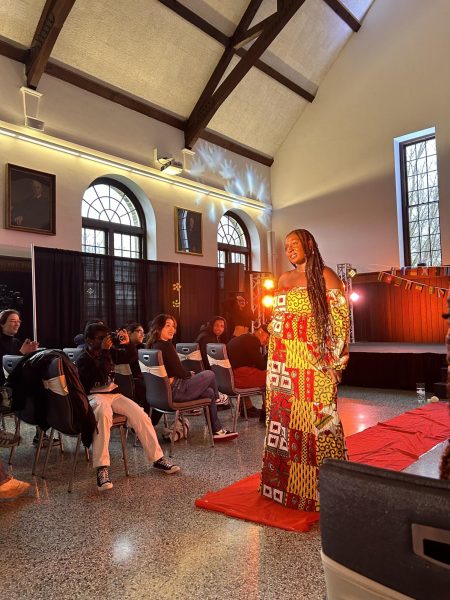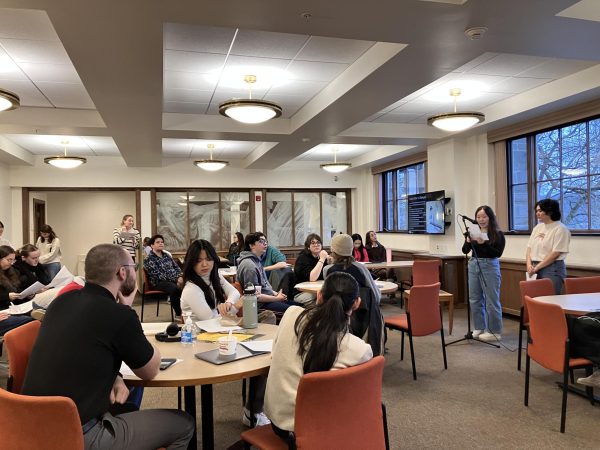Aja Monet Poetry Sparks Discussion During Africana Woman’s Week

AJA MONET: Poet Aja Monet inspires students with her her discussion of racial inequality during SORT’s Africana Women’s Week.
On Friday night, the Sisters of the Round Table (SORT), in collaboration with Lounge and Broad Street Association, presented The Thickness: Aja Monet. The event was one of many taking place during SORT’s Africana Women’s Week(s), two weeks aimed at spreading love and peace around campus while bringing awareness to issues for women of color.
In a week in which the Colgate community endured bitter cold, those in attendance of the event had the opportunity to wind down, warm up and engage in spirited conversation with Aja Monet, a 27-year-old award-winning poet, writer and human rights activist. At just 19 years old, Monet became the youngest poet to become Nuyorican Poets Cafe Grand Slam Champion. Today she travels the world, using the language of poetry to speak to people about society and opportunities for change.
Monet, sporting a hijab to express solidarity with the oppressed Pakistani people, delivered a clear message: racial inequality starts early in life and permeates all levels of society. Today’s racism is instilled, absorbed and carried out subconsciously; a form less overt than in decades past, but equally as harmful.
“What kind of human comes out of the womb of an oppressed black woman?” Monet asked. “How can the system change if right off the bat one baby has it significantly easier than the other?”
Monet admits these issues are difficult to address, but poetry can be used as a mechanism to do so. Poetry, like music, is a form of expression that breaks down barriers and encourages deeper thought.
“Poetry in its essence, when you’re doing the hard work of discussing the things you’re afraid to tell, to admit the deepest dark secrets, is de-colonizing the imagination,” Monet said.
According to Monet, she enjoys speaking to the country’s youth because they are at the forefront of every big change to come. At this pivotal juncture in American society, when many deny racism’s continued influence, the youth have the power to carve the future path. Monet warns that change won’t come tomorrow, but the sooner we put in an effort to change society, the quicker we will see results.
“We live in a system based off the urge to ejaculate,” Monet said. “That’s how the system runs. Off of climatic spectacles and quick fixes. No long term vision.”
Monet challenged the students she spoke with to envision America in 10, 20 and 50 years. She emphasized the importance of addressing the root of the problem, instead of working to cover it up or find temporary solutions. Perhaps Monet’s most poignant message centered on the contagious nature of empathy.
“When you are empathetic you feel other people’s pain and struggle, and in turn you will be less likely to hurt them,” Monet said.
Monet encouraged us to treat the struggles of others as our own, as our struggles are inherently linked. When we internalize those struggles and stand side-by-side with our peers, we are more powerful and more likely to affect meaningful change.






